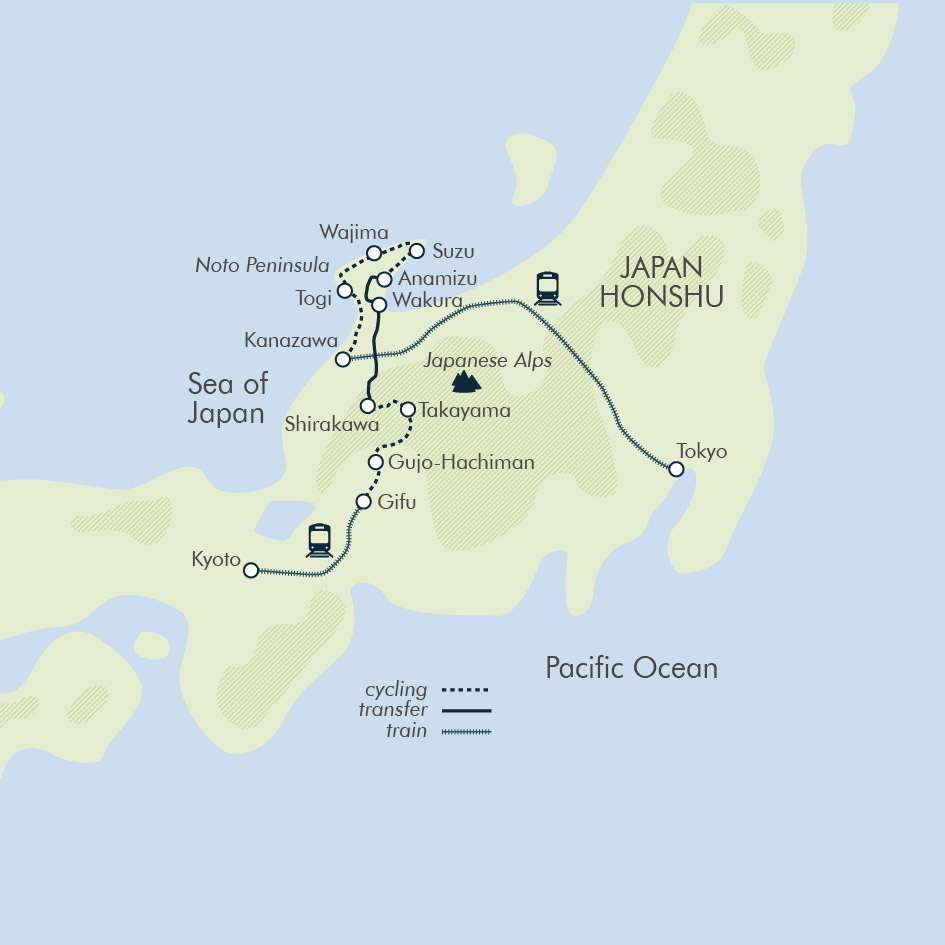
- Cycle rural roads through peaceful Japanese countryside
- Discover temples, zen gardens and geisha districts in Kyoto
- Ride along the picturesque shores of the Noto Peninsula
- Visit the UNESCO historic village of Shirakawa-go
- Stay in authentic guesthouses and bathe in hot springs
We use a mix of hotels and ryokans (traditional Japanese inns).
The hotels are usually centrally located, have modern facilities, and English-speaking staff.
We also stay in ryokans (traditional inns). While comfortable and full of local character, rooms do not generally have private facilities and bedding is normally thick futon mattresses placed on tatami mats on the floor. Almost all the accommodations have a private onsen, which means you can soak as soon as you arrive in from cycling, a superb way to recuperate after a day on the bike.
In the Unesco-listed town of Shirakawa-go, we usually spend one night in a gassho-zukuri farmhouse. In the traditional style, guest rooms come with tatami mat floors, futons and a low table. Toilets are typically modern but shared. Due to limited availability, the group may stay in different houses near each other and the accommodation may be dormitory style with up to six people (split according to sex) sharing a room. Staying here is a unique and memorable experience.
A single supplement can be booked only for the seven nights’ hotel accommodation in Tokyo, Kanazawa, Wajima, Gifu and Kyoto for a supplement payable at the time of booking and subject to availability. Elsewhere a single room may be available locally on payment of a supplement but, as some of the hotels and ryokans used are quite small, this cannot be guaranteed.
Please note, the below accommodations are the standard. However, there may be some departures where groups stay at similar establishments of a similar quality.
Tokyo: Hotel Sunroute Stellar Ueno or Hotel Sunroute Asakusa Hotel
Kanazawa: Garden Hotel or Daiwa Roynet Miyabi
Togi: Kogetsukan Ryokan
Wajima: Route Inn Hotel
Suzu: Noto Jiso Ryokan
Wakura Onsen: Noto Club
Shirakawago: Gassho Zukuri Houses or Toyota Shirakawa-Go Eco-Institute (when gassho-zukuri not available)
Takayama: Wat Hotel/SPA Alpina or Hida Tomoe Hotel
Gujo Hachiman: Onoso Ryokan
Gifu: Hotel Resol Gifu
Kyoto: Hotel Resol Kyoto Kawaramachi Sanjo or Vista Premio
Onsen (Japanese public bath)
For many visitors to Japan, the onsen is unfamiliar territory. An onsen is a Japanese hot spring and the bathing facilities and inns frequently situated around them. The combination of a strict bathing etiquette, that nudity is compulsory, and that the water temperature is often hotter than most hot tubs can cause some reluctance for first timers. However, once the courage is mustered, you may discover that an onsen dip is a trip highlight. Please note, you may be refused entry if you have large, visible tattoos. The leader will explain etiquette but it is expected that you shower before stepping into the hot spring/bath.